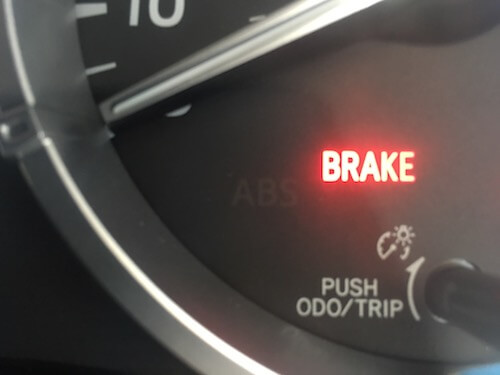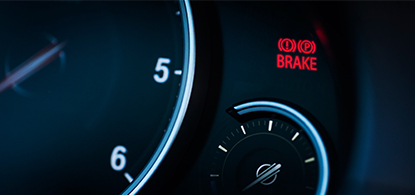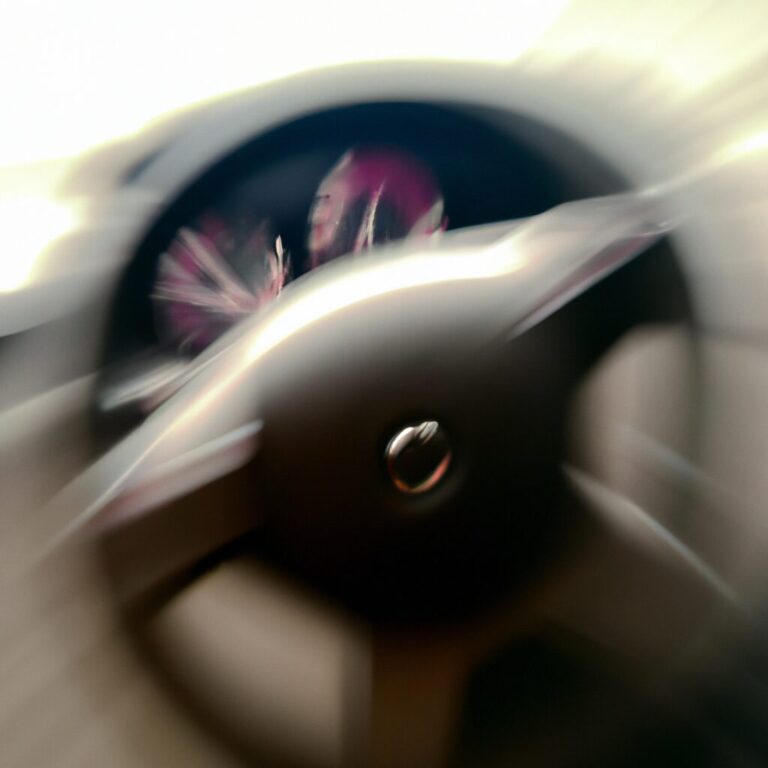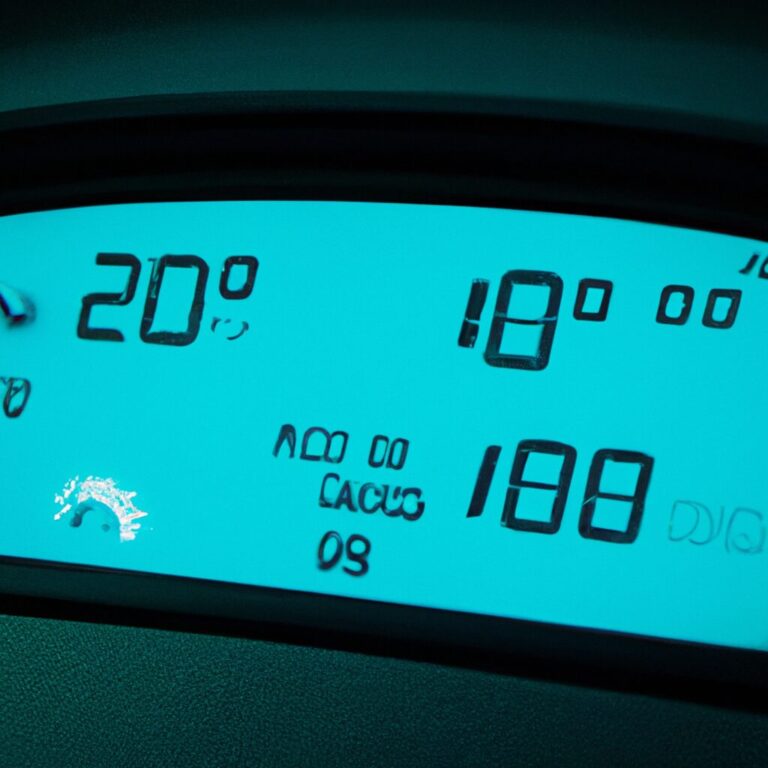Brake Light Comes on While Driving
If your brake light comes on while driving, it could indicate a potential issue with your vehicle’s braking system. The brake light is a warning indicator that should not be ignored as it can signal problems such as low brake fluid levels, worn brake pads, or issues with the braking system’s sensors.
Driving with a brake light on can be unsafe and increases the risk of accidents. It is crucial to address the underlying cause of the brake light coming on to ensure the safety and functionality of your vehicle. Ignoring the warning sign can lead to more severe brake malfunctions, compromising the overall safety of your vehicle.
By addressing the issue promptly, you can prevent further damage and ensure the proper functioning of your brakes while driving.

Credit: aplusjapaneseautorepair.com
Common Reasons For Brake Light Coming On
If you notice that your brake light is coming on while you’re driving, it can be a cause for concern. Ignoring this warning can lead to potential safety issues and costly repairs. In this blog post, we will explore the common reasons why your brake light may come on and what you should do to address the issue.
Low Brake Fluid Level
One of the common reasons for the brake light coming on is a low brake fluid level. Brake fluid is a crucial component in your vehicle’s braking system as it helps to transmit force from the brake pedal to the brake pads, allowing your car to stop effectively. When the brake fluid level drops below the recommended level, it can indicate a potential leak or excessive brake pad wear. If you notice the brake light coming on, it is essential to check your brake fluid level immediately.
Worn Brake Pads Or Rotors
Another reason for the brake light coming on is worn brake pads or rotors. Over time, the friction between the brake pads and rotors can cause them to wear down. When this happens, it can lead to reduced braking performance and potentially affect your safety on the road. The brake light serves as a warning that it’s time to have your brake pads or rotors inspected and replaced if necessary. Ignoring this can result in further damage to your braking system and more costly repairs.
Issues With Brake System Sensors
Issues with brake system sensors can also trigger the brake light to come on. Your vehicle’s braking system relies on various sensors to monitor the performance and integrity of the brakes. If any of these sensors detect a problem, such as uneven braking pressure or a malfunctioning ABS (anti-lock braking system), the brake light may illuminate. It’s crucial to have the brake system sensors inspected and repaired to ensure your braking system is functioning optimally.
| Common Reason | Actions to Take |
|---|---|
| Low Brake Fluid Level |
|
| Worn Brake Pads or Rotors |
|
| Issues with Brake System Sensors |
|
It’s important to address the reason behind your brake light coming on promptly. By taking these necessary actions and seeking professional help when needed, you can ensure the safety and reliability of your vehicle’s braking system. Don’t ignore the brake light warning – it’s there to keep you safe on the road.

Credit: www.powerstop.com
Potential Risks And Hazards
Experiencing a brake light coming on while driving can signal potential risks and hazards. This situation may indicate problems with the braking system, such as low brake fluid, worn brake pads, or a faulty brake light switch. Addressing these issues promptly is crucial for ensuring road safety and preventing potential accidents.
The brake light coming on while driving poses potential risks and hazards that can compromise the safety of the vehicle and its occupants.Effect On Braking Performance
A malfunctioning brake light can lead to decreased braking effectiveness. Diminished brake performance due to a faulty brake light can increase the risk of accidents. Drivers may not be alerted promptly to potential braking issues, impacting their ability to respond.Impact On Vehicle Safety
A brake light that remains on can confuse other motorists and lead to rear-end collisions. Diminished visibility of braking intentions compromises overall road safety. Failure to address a brake light issue promptly can result in regulatory penalties.Immediate Actions When Brake Light Comes On
When the brake light comes on while driving, it’s crucial to take immediate actions to ensure your safety on the road.
Check Brake Fluid Level
Inspect the brake fluid level by locating the reservoir under the hood of your car.
- If the level is low, top up with the recommended brake fluid type to prevent brake failure.
Inspect Brake Pads And Rotors
Examine the brake pads and rotors for any signs of wear or damage.
- Replace worn brake pads or damaged rotors to maintain optimal braking performance.
Consulting A Mechanic
If the brake light remains on after checking the fluid and brake components, seek professional help.
- A mechanic can diagnose any underlying issues and conduct necessary repairs to ensure safe driving.
Preventive Maintenance
Regular preventive maintenance is essential for ensuring the safety and performance of your vehicle’s braking system. By taking proactive steps to inspect and maintain your brakes, you can avoid potential issues like your brake light coming on while driving. Here are a few key areas to focus on when it comes to preventive maintenance for your brakes.
Regular Brake System Inspections
Regular brake system inspections play a crucial role in catching potential problems before they escalate. It is recommended to have your brakes inspected by a qualified mechanic at least once a year. During these inspections, the mechanic will assess the overall condition of your braking system, including the brake pads, rotors, and calipers.
They will also check for any signs of brake fluid leaks and evaluate the brake system’s hydraulic components. By conducting these inspections, you can identify any wear and tear, uneven brake pad wear, or leaks that could lead to the brake light coming on while driving.
Brake Fluid Checks And Replacements
Keeping an eye on your brake fluid levels is another important aspect of preventive brake maintenance. The brake fluid plays a crucial role in transferring the force from the brake pedal to the brake pads. Over time, brake fluid can accumulate moisture and become contaminated, hindering its ability to perform effectively.
Regularly checking the brake fluid level and its condition, as indicated by the vehicle manufacturer’s guidelines, is essential. If the brake fluid is low or appears discolored, it may be necessary to have it replaced. By maintaining proper levels and replacing the brake fluid as needed, you can prevent issues that might trigger the brake light to come on.
Brake Pad And Rotor Replacements
Worn-out brake pads or damaged rotors can cause your brake light to come on while driving. Brake pads tend to wear down over time due to continuous friction, and rotors can become warped or scored, affecting braking performance. It is important to replace worn brake pads and damaged rotors promptly to maintain optimal braking functionality.
It is recommended to follow the vehicle manufacturer’s guidelines for brake pad and rotor replacements. Most brake pads include wear indicators that emit a squealing noise when the pads have reached their minimum thickness. By paying attention to these warning signs and promptly replacing worn-out parts, you can prevent potential brake issues and keep the brake light from coming on during your journey.
In conclusion, being proactive about brake system maintenance is vital for preventing unexpected brake problems while driving. Regular inspections, checking and replacing brake fluid as needed, as well as promptly replacing worn brake pads and damaged rotors, ensure your brakes operate safely and efficiently. By incorporating these preventive maintenance practices, you can keep your brake light from causing any concern during your journeys.

Credit: www.wagnerbrake.com
Frequently Asked Questions On Brake Light Comes On While Driving
Why Did My Brake Light Come On While Driving?
The brake light may come on due to low brake fluid, worn brake pads, or a faulty sensor. Check the brake fluid level and inspect the brake pads for wear and tear. If the issue persists, seek professional help for a thorough inspection and appropriate repairs.
Why Is My Brake Light On But Brakes Work Fine?
The brake light can remain on even when the brakes are functioning properly. This could be due to a faulty brake light switch, low brake fluid, or a problem with the brake system’s wiring. It’s important to have the issue diagnosed by a mechanic to ensure your vehicle’s safety.
Is It Safe To Drive Your Car With The Brake Light On?
Driving with the brake light on is unsafe. It indicates an issue with the braking system that requires immediate attention. Consult a mechanic for repairs to ensure safe driving.
Why Does My Brake Light Come On Then Off?
Your brake light may come on then off due to a loose wire connection or a faulty brake light switch. Get it checked by a professional for safety.
Why Is My Brake Light Coming On While Driving?
The brake light may come on due to low brake fluid, worn brake pads, or an electrical issue. It’s essential to check these components to ensure safe driving.
What Should I Do If My Brake Light Comes On?
Immediately reduce your speed and check your brake fluid level. If it’s low, top it up, but have your braking system inspected by a professional to ensure safety.
Is It Safe To Continue Driving If The Brake Light Is On?
It’s not recommended to drive with the brake light on, as it indicates potential brake system issues. Continuing to drive could compromise safety.
Conclusion
To sum up, if you notice your brake light coming on while driving, it is crucial not to ignore it. It could indicate a variety of potential issues, such as low brake fluid, a faulty brake switch, or worn brake pads.
Addressing these problems promptly will ensure your safety and help prevent any further damage to your vehicle. Remember, always consult a professional mechanic to properly diagnose and fix the issue.


